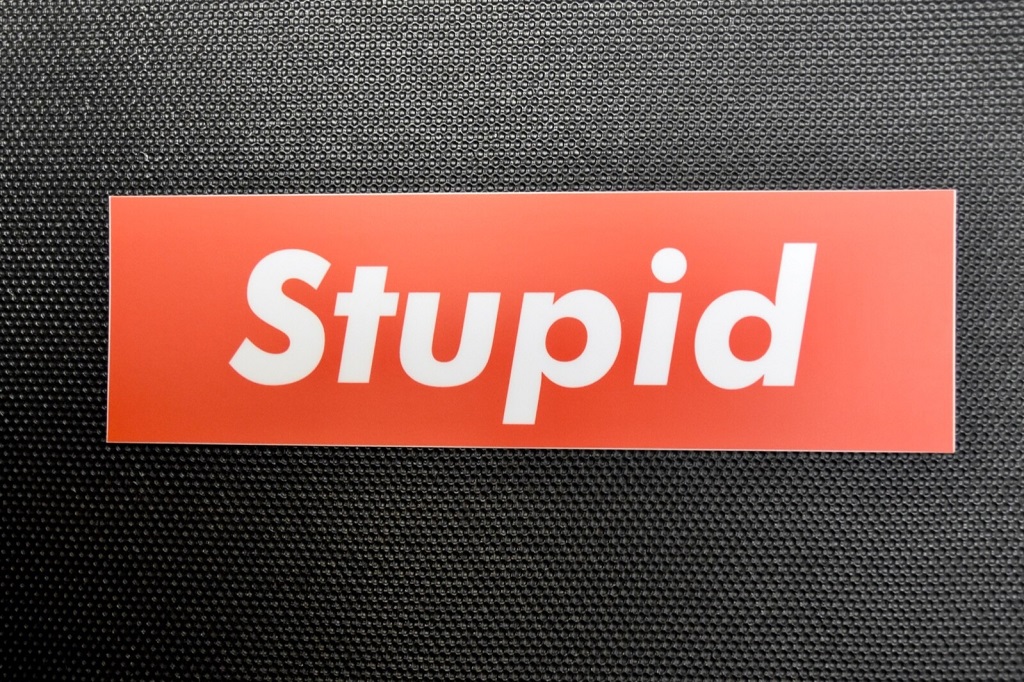Is calling something or someone “stupid” inherently wrong? The debate around the word “stupid” often sparks curiosity, as its usage can stir emotions or even offend. At its core, “stupid” describes a lack of intelligence or poor judgment, but its impact depends heavily on context, intent, and audience. Some view it as a harmless descriptor, while others see it as a harmful label that belittles or shames. This article dives into whether “stupid” qualifies as a bad word by exploring its linguistic roots, social implications, and cultural perceptions. We’ll answer common questions, provide historical context, and offer practical insights into when and why the word might be problematic. By examining real-world scenarios and expert opinions, we aim to clarify whether “stupid” deserves its controversial reputation or if it’s simply misunderstood.
Is Stupid a Bad Word? Yes or No
No, but it depends on context.
The question is stupid a bad word yes or no doesn’t have a clear-cut answer because language is rarely black-and-white. The word “stupid” isn’t inherently a bad word like profanity or slurs, which carry universally offensive connotations. Instead, its appropriateness hinges on how, where, and why it’s used. For instance, saying, “That was a stupid mistake” in a casual setting might be fine, but calling a person “stupid” in a professional or educational environment can feel demeaning. Context shapes perception. A 2019 study from the Journal of Language and Social Psychology noted that words like “stupid” can negatively affect self-esteem when used as personal insults, particularly among children. However, the same study found that when used to describe actions or ideas rather than people, the word often carries less emotional weight.
Let’s break this down further. The word’s impact varies across settings:
- Informal Settings: Among friends, “stupid” might be playful or teasing, like saying, “Don’t be stupid, you know I’m joking.” Here, it’s unlikely to offend.
- Formal Settings: In workplaces or classrooms, labeling someone’s idea as “stupid” can undermine confidence and collaboration.
- Cultural Differences: In some cultures, direct criticism using words like “stupid” is taboo, while in others, it’s more acceptable.
Therefore, while “stupid” isn’t a bad word in the sense of being profane, its potential to harm depends on delivery and audience sensitivity. Awareness of these nuances can guide better communication choices.
What Is the Origin of the Word ‘Stupid’?
It comes from Latin, meaning “struck senseless.”
The etymology of “stupid” provides insight into its original intent. Derived from the Latin word “stupidus,” meaning “struck senseless” or “stunned,” it initially described a state of mental numbness or shock rather than a lack of intelligence. Over time, its meaning evolved. By the 16th century, English speakers used “stupid” to describe foolishness or a lack of understanding, according to the Oxford English Dictionary. This shift reflects how language adapts to social needs, moving from describing temporary states to more fixed characteristics.
Interestingly, “stupid” wasn’t always a loaded term. In early usage, it was more neutral, akin to saying someone was confused or slow to grasp something. However, as society placed greater value on intelligence and education, particularly during the Enlightenment, “stupid” began to carry a negative stigma. Today, its connotations are shaped by how it’s wielded—whether as a lighthearted jab or a cutting insult. Understanding this history helps explain why the word isn’t inherently “bad” but can feel so in certain contexts.
Why Do Some People Consider ‘Stupid’ Offensive?

It can feel like a personal attack on intelligence.
For many, the word “stupid” stings because it targets a core aspect of identity: intelligence. When directed at a person, it can imply inadequacy or inferiority, which cuts deeper than criticizing a specific action. A resource from TeamFat Kids highlights how language impacts self-perception, noting that labels like “stupid” can erode confidence, especially in children or those already struggling with self-esteem. This aligns with findings from the American Psychological Association, which suggest that negative labels can contribute to anxiety and lower academic performance in young learners.
Several factors amplify the word’s potential to offend:
- Intent: If the speaker intends to belittle, the word feels harsher. A teacher saying, “That’s a stupid answer” can demoralize a student.
- Target: Calling a person “stupid” is more likely to offend than describing an inanimate object or abstract idea.
- Context: In professional or sensitive settings, the word can seem unconstructive or unprofessional.
Additionally, societal attitudes toward intelligence play a role. In cultures that prize academic achievement, being labeled “stupid” can feel like a social failure. Conversely, in environments where resilience or creativity is valued over book smarts, the word may carry less weight. Recognizing these dynamics helps explain why reactions to “stupid” vary so widely.
Is It Ever Okay to Use ‘Stupid’?
Yes, when used thoughtfully and not directed at people.
The acceptability of “stupid” depends on how it’s applied. Using it to describe actions, ideas, or objects—rather than people—often reduces its potential to harm. For example, saying, “That was a stupid decision” focuses on the act, not the person’s character. This distinction is key. A 2021 article from Psychology Today emphasizes that constructive criticism should target behaviors, not identities, to foster growth rather than shame.
Here are scenarios where “stupid” might be appropriate:
- Casual Conversations: Among friends, “stupid” can be a lighthearted way to tease, like, “Why’d you do something so stupid?”—as long as all parties understand the tone.
- Self-Deprecation: People often use “stupid” to describe their own mistakes, like, “I feel so stupid for forgetting that.” This can be a way to process errors without judgment.
- Describing Objects or Situations: Calling a malfunctioning gadget “stupid” or a poorly designed system “stupid” is unlikely to offend anyone.
However, caution is needed. Even in these cases, tone and audience matter. If someone is particularly sensitive to the word, even a playful use might misfire. The key is to gauge the setting and the listener’s perspective before using it.
How Does Context Shape the Perception of ‘Stupid’?
Context determines whether it’s neutral or hurtful.
Context is everything when it comes to “stupid.” The same word can be harmless in one situation and deeply offensive in another. For example, in a classroom, a teacher calling a student’s response “stupid” might discourage participation, while friends joking about a “stupid” movie might bond over shared humor. The difference lies in intent, delivery, and the relationship between speaker and listener.
Consider these contextual factors:
- Relationship: Close friends can often use “stupid” playfully without issue, while strangers or authority figures risk seeming dismissive.
- Setting: In professional environments, “stupid” can undermine credibility, whereas in informal settings, it’s often shrugged off.
- Tone: A sarcastic or condescending tone can make “stupid” feel like an attack, while a neutral or joking tone softens it.
Moreover, cultural norms influence perception. In some Asian cultures, for instance, direct criticism like calling something “stupid” is avoided to maintain harmony, according to cross-cultural communication studies. In contrast, Western cultures may tolerate it more, especially in informal settings. Understanding these nuances can help navigate the word’s use effectively.
Are There Alternatives to Using ‘Stupid’?
Yes, kinder words can convey the same idea.
If “stupid” feels too harsh, there are plenty of alternatives that communicate similar ideas without the emotional baggage. Choosing a different word can maintain clarity while reducing the risk of offense. Here are some substitutes, depending on the situation:
- For Actions: “Unwise,” “careless,” or “thoughtless” can describe mistakes without attacking character.
- For Ideas: “Impractical,” “flawed,” or “unworkable” critique concepts constructively.
- For People: Instead of labeling someone “stupid,” phrases like “not thinking it through” or “could use more clarity” focus on behavior.
Using alternatives isn’t about avoiding honesty but about fostering respect. For example, instead of saying, “That’s a stupid plan,” try, “That plan might need more refinement.” This approach, supported by communication experts, encourages dialogue without alienating anyone. Resources like Psychology Today stress that word choice shapes relationships and outcomes, making thoughtful language a powerful tool.
Conclusion
The word “stupid” isn’t inherently bad, but its impact depends on how it’s used. While it’s not a curse word, calling someone “stupid” can hurt feelings or damage confidence, especially in sensitive settings like schools or workplaces. Its historical roots show it wasn’t always a loaded term, but modern usage has tied it to judgments about intelligence, which can sting. By understanding context, intent, and audience, you can decide when “stupid” is appropriate or when a kinder alternative works better. Language shapes how we connect, so choosing words thoughtfully matters. Want to dive deeper into how words affect us? Check out resources like TeamFat Kids for more insights on communication and personal growth. Share your thoughts below—have you ever felt the sting of “stupid,” or do you think it’s no big deal?
Read More Also: Enjoy your Autumn Family Trip to the Cotswolds
FAQ Section
Is “stupid” a swear word?
No, it’s not a swear word, but it can offend in certain contexts.
“Stupid” lacks the explicit nature of profanity, but its potential to insult makes it risky in formal or sensitive settings. It’s best used sparingly and not directed at people.
Can calling someone “stupid” be harmful?
Yes, especially for children or in professional settings.
Labeling someone “stupid” can lower self-esteem and discourage participation, particularly in educational environments, as noted in studies from the American Psychological Association.
Is it okay to call an idea “stupid”?
Usually, yes, if done constructively.
Describing an idea as “stupid” is less likely to offend than targeting a person, but alternatives like “impractical” are often more diplomatic and encourage better dialogue.
Why does “stupid” feel worse than other words?
It targets intelligence, a sensitive trait.
Intelligence is closely tied to identity, so “stupid” can feel like a personal attack, unlike words that critique specific actions without judgment on character.
How can I avoid offending someone with “stupid”?
Focus on actions, not people, and consider alternatives.
Use words like “unwise” or “flawed” and ensure your tone is constructive, especially in professional or unfamiliar settings.
Does culture affect how “stupid” is perceived?
Yes, cultural norms shape its impact.
In cultures valuing indirect communication, like many Asian societies, “stupid” may be seen as rude, while in direct cultures, it might be more acceptable.
Should I stop using “stupid” altogether?
Not necessarily, but use it wisely.
“Stupid” can be fine in casual or humorous contexts, but in formal or sensitive situations, kinder alternatives are safer and more respectful.
